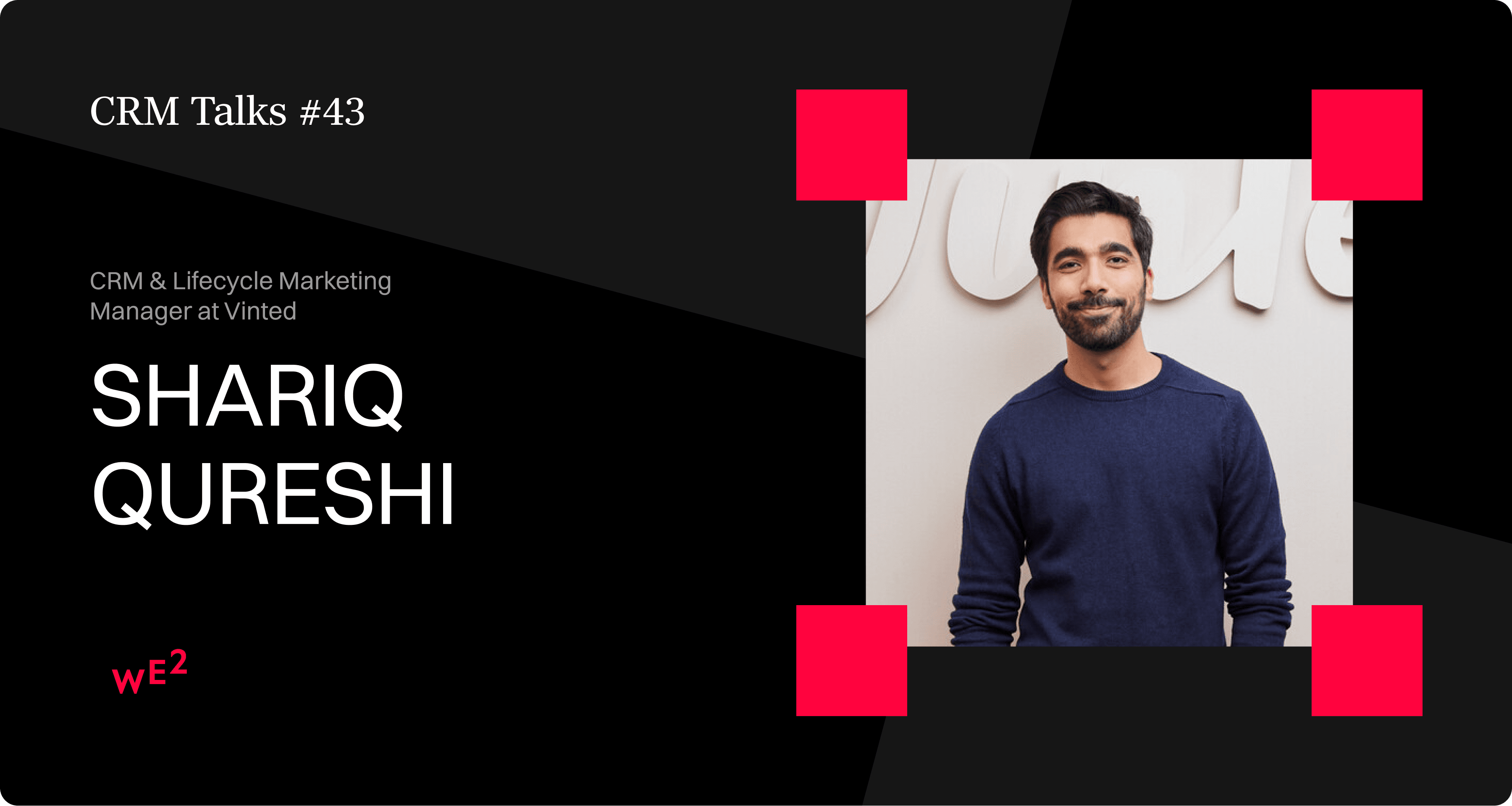
10.11.2025
CRM Talks #43 with Shariq Qureshi
Shariq Qureshi, CRM & Lifecycle Marketing Manager at Vinted, explains why CRM’s job is “to listen,” not “to talk,” and gives his perspective on the conversational future of communication with customers.
About
Greet our new CRM Talks speaker! It’s Shariq Qureshi, CRM & Lifecycle Marketing Manager at Vinted, Europe's leading second-hand marketplace.
Shariq participated in our traditional interview, highlighting that the main CRM goal is not sending messages, but influencing customer behavior and driving actions. He emphasized that timing and relevance are the most important factors. According to Shariq’s belief, in the future, CRM will become both smarter and quieter—with adaptive systems and a human touch alongside.
What’s one outdated belief about CRM that should be left behind?
That CRM is just about sending messages—emails, pushes, in-apps. This mindset limits how much impact CRM can truly have.
In reality, CRM today should be about influencing customer behavior and strengthening long-term value, not simply managing communication channels. I’ve seen teams (including my past self) chase “send volume” and “open rates”—but those are outputs, not outcomes.
What really counts is whether your CRM drives an action that matters to both the business and the user—listing an item, completing a purchase, staying active for 90 days, or re-engaging after a drop-off.
So, the outdated belief I’d leave behind is that CRM’s job is “to talk.” Its real job is “to listen”—to signals, to behavior, to friction—and respond meaningfully. That mindset shift changes everything: how you brief, how you measure, and how your CRM team collaborates with product and data.
What’s the most underrated CRM tactic or feature right now?
For me, it’s recency- and intent-based micro-segmentation—and using it consistently. We often talk about personalization, yet many brands still send to everyone in a massive segment based on data that’s days or weeks old. The biggest performance lifts I’ve seen usually come from something simpler: timing + relevance.
If someone’s active today, talk to them today—not next week. If someone’s losing momentum, recognize it before they’re gone.
Simple, high-impact moves include:
- Dynamic segments that refresh hourly
- Scoring users by how recently and how deeply they engaged
- Triggering messages aligned with where the user is in their habit curve
Those often outperform any fancy AI feature. CRM isn’t about more sophistication—it’s about more sensitivity to user behavior.
How do you imagine CRM will look in 2028?
By 2028, CRM will feel a lot quieter—but a lot smarter. Instead of manually building dozens of journeys, we’ll use adaptive systems that respond in real time to user signals. Our role as CRM managers will shift from “creating campaigns” to designing decision systems—setting the logic, ethics, and brand tone while the platform handles execution.
Messages will feel more like conversations—short, contextual, and timely, not scheduled blasts. And much of CRM will happen inside the product, not in the inbox.
Even as automation grows, the human side—empathy, transparency, trust—will matter more than ever. Users will expect relevance and respect. The brands that win will be those that automate without losing their voice or their ethics.
Bonus

People who shaped your CRM perspective
Early on in my career, I was lucky to work with an incredible team at Daraz (Alibaba Group)—especially my lead, Fabaiha Farooq. That experience was foundational in shaping how I think about CRM.
They introduced me to the intersection of data, product, and communication, and taught me how to design micro-segmentation, anticipate challenges, and scale strategies across markets. I still draw inspiration from that time—many of those lessons continue to shape how I build and think about CRM today.
About Vinted
Vinted is Europe’s leading second-hand marketplace, empowering millions of members across 20+ countries to buy and sell pre-loved fashion and lifestyle items. Founded in 2008 in Lithuania, Vinted aims to make second-hand the first choice worldwide.

READY TO START?
Fill out the form, and we’ll reach out shortly to discuss your project.
